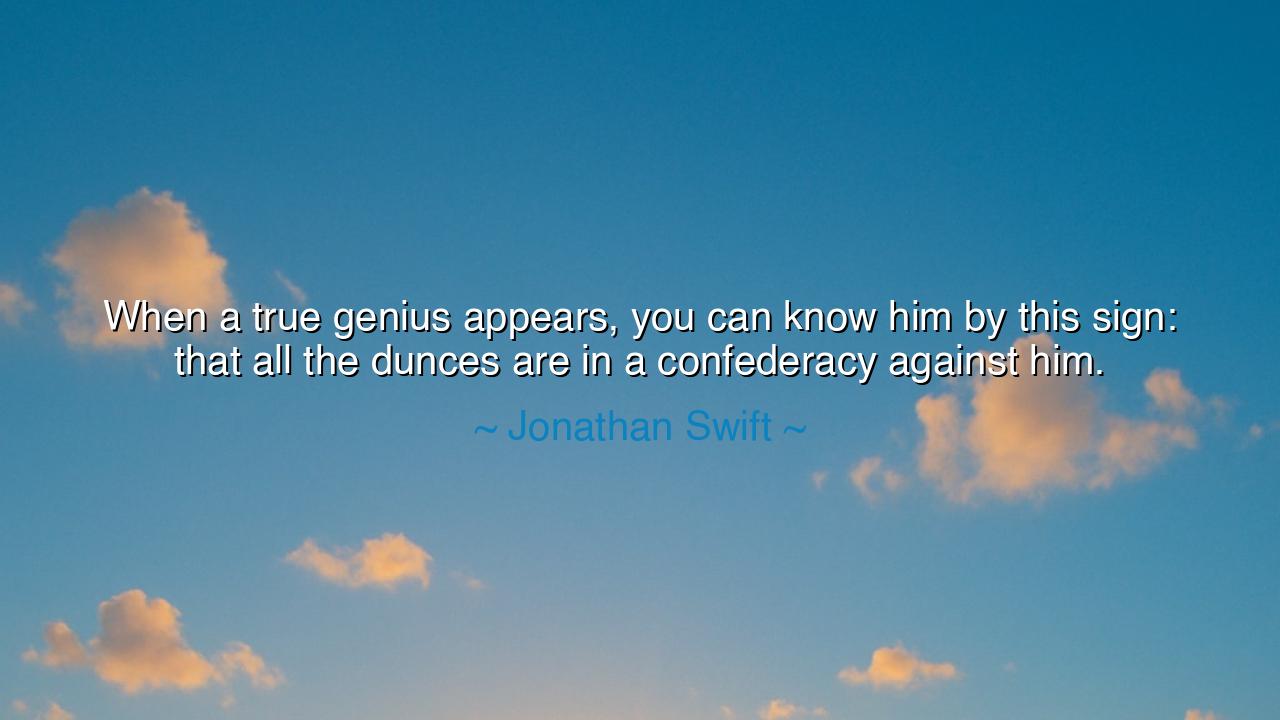
When a true genius appears, you can know him by this sign: that
When a true genius appears, you can know him by this sign: that all the dunces are in a confederacy against him.






The words of Jonathan Swift, the fierce satirist and defender of truth, strike like a sword through the ages: “When a true genius appears, you can know him by this sign: that all the dunces are in a confederacy against him.” In this single sentence, Swift unmasks the eternal tragedy of wisdom—that the one who sees too deeply is often scorned by those who cannot see at all. The true genius, like a solitary flame in the dark, illuminates truths that others would rather not behold. And those who fear that light, the dunces, join hands in their ignorance, forming a league of mockery, a confederacy of mediocrity, to extinguish what threatens their comfort.
Swift himself knew the bitterness of that truth. A man of immense intellect, he wrote not to flatter, but to awaken. His works—Gulliver’s Travels, A Modest Proposal, The Tale of a Tub—pierced through the hypocrisy of his age with satire so sharp it bled truth. Yet for his brilliance he was misunderstood, even hated. Swift’s words reflect not arrogance but observation: that the genius, by nature, walks alone. The crowd despises what it cannot comprehend. The dunces, bound by fear and convention, find unity only in resistance to the extraordinary.
The true genius does not seek rebellion; he simply sees the world as it is. But his very sight becomes rebellion in the eyes of the blind. When Galileo lifted his gaze to the heavens and proclaimed that the Earth moved around the Sun, the confederacy arose—the priests, the scholars, the self-appointed guardians of truth. They mocked him, silenced him, condemned him. Yet time itself took his side, and the heavens, once forbidden, opened in splendor. So it ever is: the genius is mocked in life, honored in death. His fire is feared until the darkness grows too deep without it.
The dunces, as Swift calls them, are not always fools in intellect—they are cowards in spirit. They cling to old certainties as drowning men clutch driftwood. To them, innovation is an insult, originality a threat. Their alliance is born not of conviction, but of fear—the fear that someone might reveal the smallness of their understanding. They cannot defeat the genius by argument, for his mind soars where theirs cannot follow; thus, they gather their numbers, their noise, their ridicule. They do not debate—they deride. They do not reason—they sneer. In their chorus of scorn, they feel the illusion of wisdom.
Yet the true genius, though wounded by rejection, must not despair. History is his witness. Socrates, poisoned for corrupting the youth, became the father of philosophy. Vincent van Gogh, dismissed and destitute, painted visions the world would one day revere. Nikola Tesla, laughed at for his dreams, built the foundations of modern electricity. Each was surrounded by dunces who formed their confederacy of doubt—and yet, each stood unbroken. For while ignorance gathers in crowds, truth walks alone, serene and immortal.
From this, O seeker, learn a sacred lesson: greatness provokes resistance. Do not measure your worth by approval, nor your truth by applause. If your vision draws mockery, take heart—it may be the mark of genius stirring within you. The opposition of the dunces is not a curse, but a confirmation. Let their derision be the wind that strengthens your flame. Remember: mediocrity demands conformity; brilliance demands courage. To think deeply, to create freely, to stand against the tide—these are the labors of the soul destined to rise above its age.
So guard your light, even when the world conspires to dim it. Let the laughter of the foolish be your music, for it heralds that you are seen as different—and to be different is the beginning of all greatness. Stand firm in solitude; the wise are often lonely, but never lost. For time will scatter the confederacy of dunces like chaff before the wind, but the word, the work, the vision of true genius endures forever.
And thus, as Swift reminds us, when the crowd gathers in mockery and the ignorant unite in scorn—take it not as defeat, but as the sign that you have touched the realm of the extraordinary. For the confederacy of dunces is the world’s oldest institution—and its only enemy has ever been genius.






AAdministratorAdministrator
Welcome, honored guests. Please leave a comment, we will respond soon